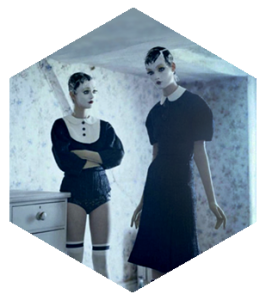April 27, 2015

By Roxxi Wallace
The way we perceive ourselves is inherently important. You can argue that beauty is in the eye of the beholder, or that everyone is unique, but we all know that’s bullshit. The way others perceive us is directly tied to our own sense of self. If you’ve been constantly told through your life that you’re beautiful, special and flawless, you will begin to believe it. If you’re told that you’re scum, psychotic, worthless and most likely to kill yourself before age 21, will you believe that too?
Let’s take a look at some famous outsiders who have gone on to do amazing things: Dylan Klebold and Eric Harris—who felt like they were overlooked and treated unfairly, who were certain that they lacked significance and substance—ended up changing the lives of thousands of people. Why? Because people perceived them to be weird, weak, and unworthy of anyone’s time. Dylan and Eric believed their lives would not improve and decided instead to destroy the lives of others before taking their own. Was this because of their upbringing? Doubtful. They were treated like they meant nothing; they believed it, and embraced it. Their sense of self was destroyed by others and that is how they came to terms with it.
Elliot Rodger came from a rich and famous family and had been given all of the material possessions he wanted throughout his life. He took the same path as Eric and Dylan, but for different reasons. He was clearly an intelligent individual but socially was not as capable as others, due to his self-entitlement and selfish, sociopathic behavior. His sense of self decided he was entitled to anything he wanted—including women. Which is a surefire tactic for making women run the other way, if you’re a social retard like Rodger was. In the end, his rage toward others for overlooking him is what drove him to kill. He demanded attention and received none. He was perceived as nobody and died as the patron saint of desperation.
But speaking of women—what about ’em? Specifically, what about the creepy outsider types? They’re rarer than their male counterparts, but where do they fit into all of this?
There are a lot of women who started off on the same track as these men and ended up in entirely different places. Jessicka, of the band Jack Off Jill, had been perceived as strange and weird during her youth, which has become the center of the persona she employs today. Her band became highly successful because it spoke directly to the girls who felt the same way she did. She continues to embrace her “creepiness” today, continuing with music and visual art.
Björk—whose strange imagery and quirky behavior changed what was acceptable in a mainstream artist—influenced a wave of similar personae in today’s pop music scene, and made being “weird” desirable on a small level.
Sylvia Plath, whose poetry touched on these subjects, understood the effects perception can have on a person. She had a troubled life which she ultimately ended.
Not all girls go on to overcome these issues or embrace them, however. An alarmingly high percentage of girls suffer from eating disorders, self-harming, abuse, and suicide. Most of the time these issues come from a place of perception. When we’re called fat, do we not wish to be thin? When called ugly, do we not wish to be beautiful? When we’re alone, don’t we prefer an abuser? When we’re beaten and raped, do we not wish for a way out?
Issues like these directly affect us, causing us to eventually believe that whatever insults and degradation we receive are deserved and true. The way that others perceive us changes how we perceive ourselves, to sometimes dangerous extents.
How many times have you seen an article shared about a hate crime toward alternative women? How did they determine which women were witches in the Salem witch hunt? Why are strange women perceived as overly aggressive creeps while strange men are perceived as weak pussies?
It all starts with perception.
Share this Post

